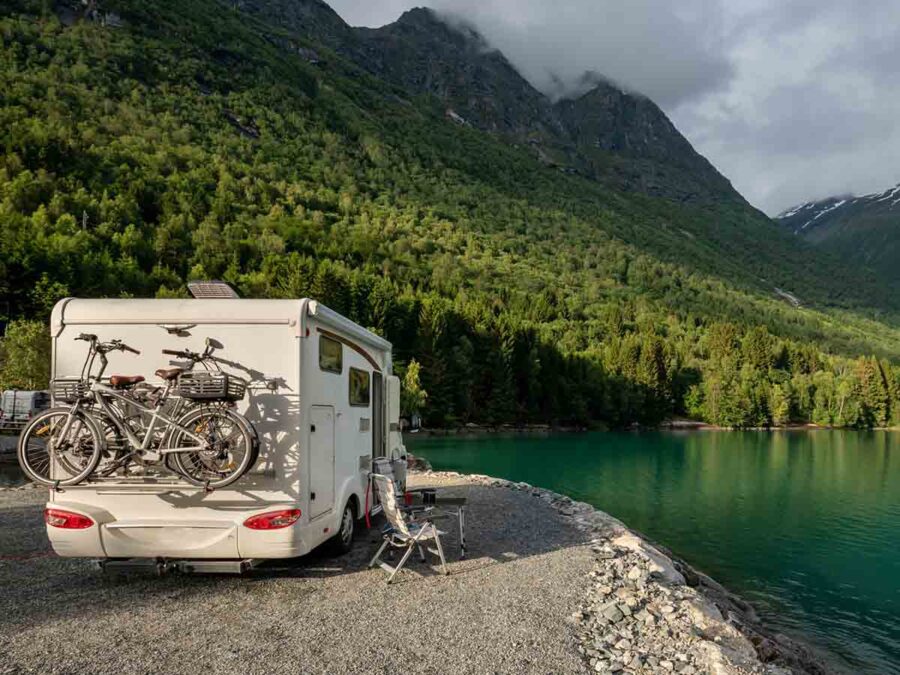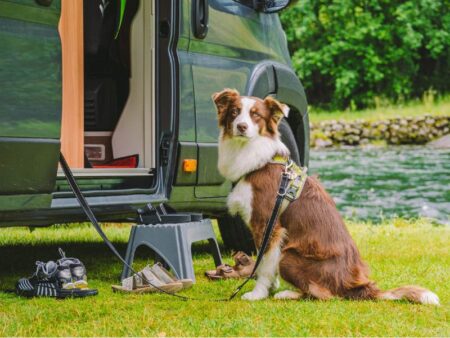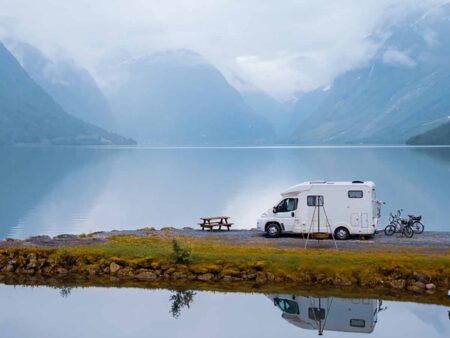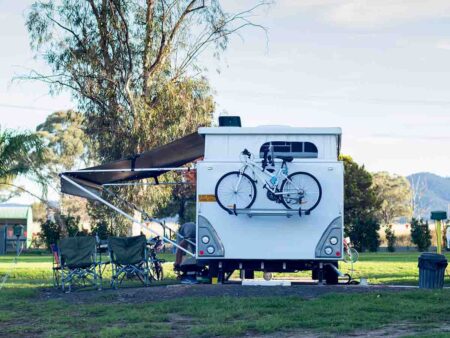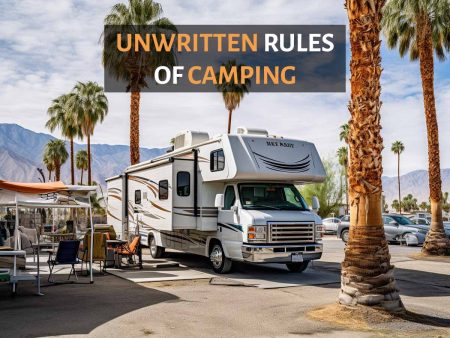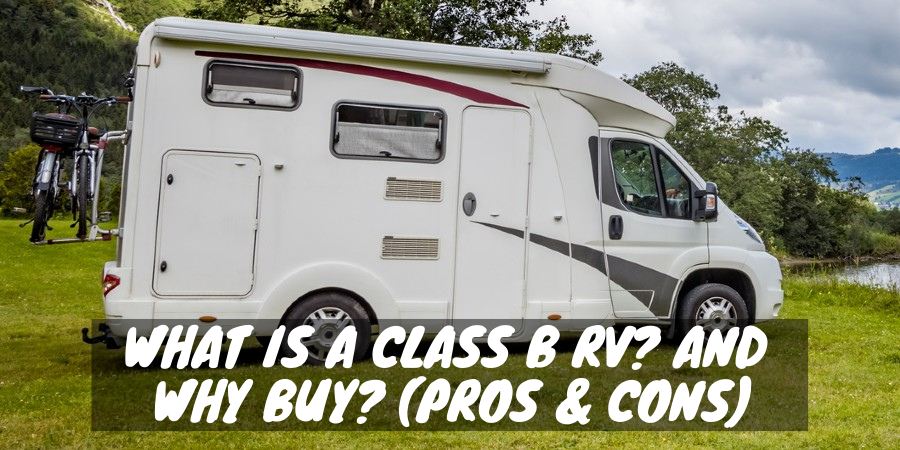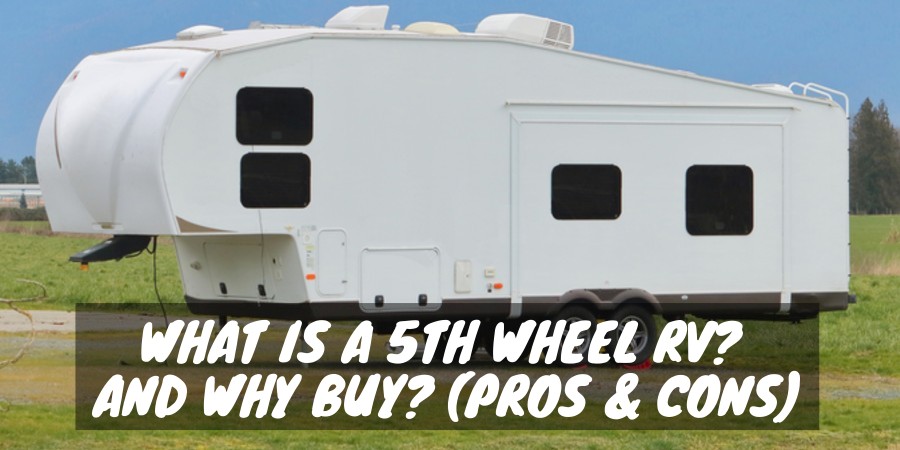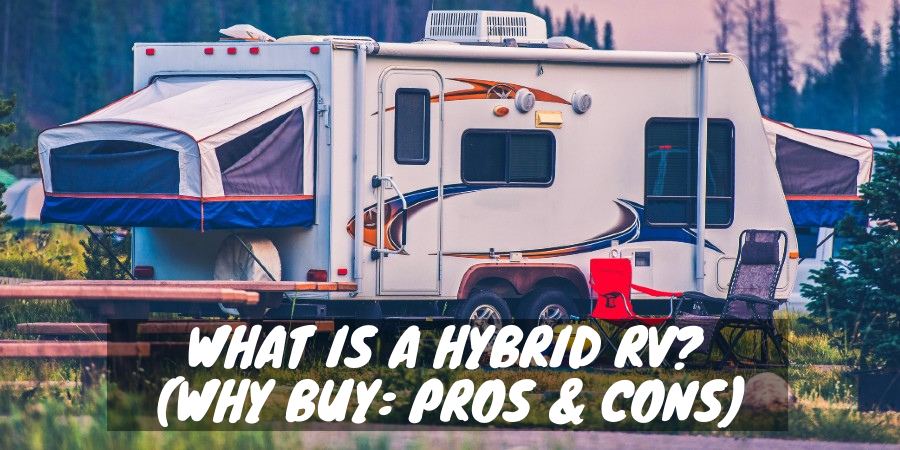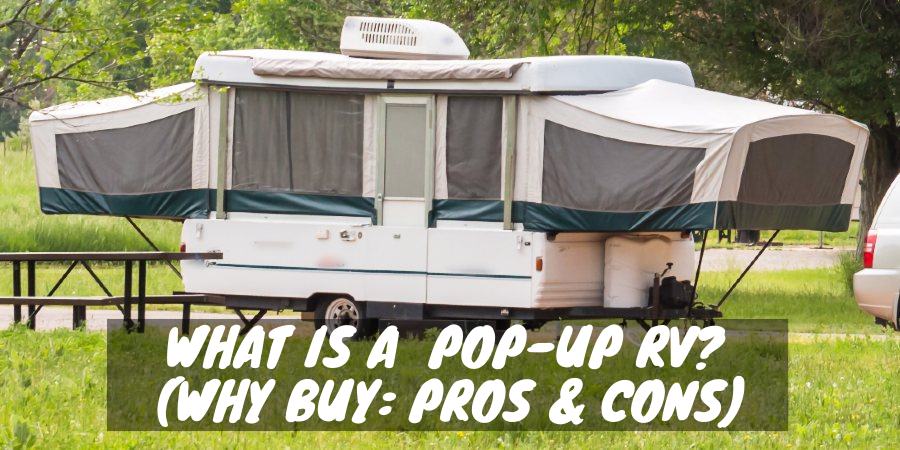Are you afraid to try RV camping because you’ve heard horror myths about what it’s like?
Unfortunately, many myths surround the RV camping experience, from living in a cramped space to being downright unsafe. To end the nonsense, we will bust five of the most common myths and give you the real low-down on what to expect when camping in a recreational vehicle.
If you’re considering the RV lifestyle, this is one article you don’t want to miss!
If you RV, we know you’ve heard plenty of comments from friends, family, and strangers about what they perceive it to be like. In most instances, people who have never gone camping in a recreational vehicle are the ones who “know it all.”
That’s why we set out to compile the most common myths about RV camping and expose the truth. When you have the facts, you’ll be in a better position to decide if an RV purchase is right for you.
Myth #1: Only Old People RV
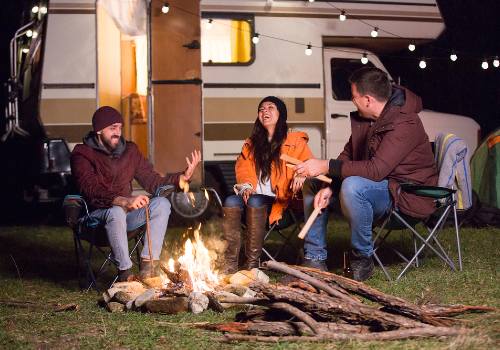
Do old people RV? Absolutely! However, the latest RVIA stats show just over half of the RVing population is under 55 years old, with almost half of those between 18 and 34.
What leads to the conclusion RVing is only for retirees is how the media portrays the lifestyle, with gramps behind the wheel doing 50 MPH on the interstate.
Another reason is that it’s common for newcomers to RV camping not to understand the ebb and flow of RV travel across the US. As a result, it’s easy to unknowingly book a campsite in a “snowbird” campground where shuffleboard, happy hour, and grey hair are all the rage.
The past five years have seen a considerable influx of new, much younger people taking up the RV lifestyle. Many travel full-time and work remotely in a campervan. At the same time, families find it a wonderful bonding experience and an affordable way to take several short or long vacations a year.
Campgrounds now have a lovely mix of ages and amenities so that kids can find playmates, young adults can hang out at the pool, and parents or couples can relax and enjoy the company of fellow guests, both young and old. You may also find it surprising to encounter the thousands of young couples and families from abroad who visit the US yearly and rent an RV to see the sites.
We all agree that the diversity in RVer age and other demographics is much broader than it was a decade ago, which only makes meeting your camping neighbors much more interesting and fun.
Myth #2: RVs Are Too Expensive for Such Little Use
This myth is true and false. Sure, if you buy a new RV only to use it for a single short vacation each year, it isn’t going to be worth it.
When it comes to prices, new RVs do not come cheap, with Class B and Class A motorhomes easily hitting the $250,000 mark. But you can buy many smaller travel trailers, pop-ups, truck campers, or teardrops for under $20,000. A mid-size motorhome ranges between $40,000-$80,000.
If you’re willing to shop, there are thousands of used recreational vehicles on the market that make getting into an RV much easier on your bank account.
No matter what your budget allows, you don’t have to consider the investment in an RV a waste if you compare what it costs for more traditional vacation alternatives. For example, it’s not uncommon to spend $5,000 for a family to fly to a destination and rent a car and hotel for a week, eating out the entire trip.
An RV allows you to travel as much as you’d like each year at a much lower cost per trip. You can have an extremely relaxing and enjoyable trip to a campground ten miles from your home, just as easy as hitting an RV resort 1,000 miles away. State and national parks offer seemingly unlimited options for affordable camping in beautiful settings across the US that you can visit on a weekend and not have to schedule time off work.
Don’t have the time to take the RV out? Put your camper on a peer-to-peer rental site such as RVShare and make money instead of placing it in storage. Or set it up on your property and let friends or family use it on visits. Heck, you can even post it on Airbnb or a similar website to generate income.
Lastly, RVs are built to last for decades. That means years of memorable camping excursions with one purchase, which lowers overall vacation expenses drastically.
Myth #3: RV Parks Are Crowded and Unsafe
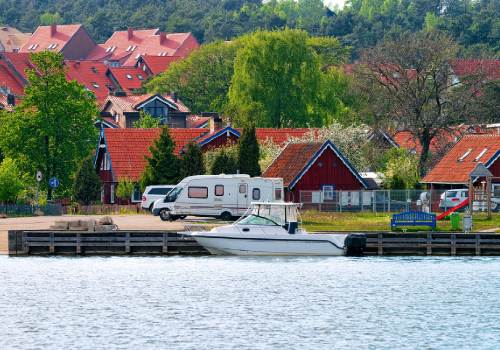
RV Park Crowds
This myth has some truth to it. Just as you find tourist destination hotels crowded, the same goes for RV parks during the high season.
Camping during summer, school breaks, or festivals means dealing with RV parks filled to capacity. Snowbird locations are packed during the winter, with populations swelling in the southwestern US, Florida, and the Gulf Coast. Pulling in and parking your RV in a full campground will be more stressful, especially in older parks with narrower roads and tighter campsites.
Crowds aren’t necessarily bad (the energy in a full park is fun), as long as you plan accordingly and book your campsite well in advance. It’s not unusual for expert RVers to reserve campsites six months to a year prior at any popular destination during the high season.
Another thing experienced RVers do is plan trips to their favorite spots during the off-season when crowds disperse. What we are trying to express is that, yes, RV parks can get crowded, but if that bothers you, you can easily adjust your plans to find a less busy campground, such as a state park ten miles from the main action, or choose a different time of year to visit.
However, the big difference is that even at peak capacity, an RV park gives guests breathing room between other guests. So, overall, more square footage of open space per guest exists than in a hotel or resort.
You aren’t sharing a wall with strangers. You have a large outdoor patio versus a tiny balcony. Lastly, you aren’t living out of a suitcase – you can bring along as many personal belongings and supplies as your camper’s GVWR allows, so you don’t have to go out and fight the crowds to get a tube of toothpaste.
RV Park Safety
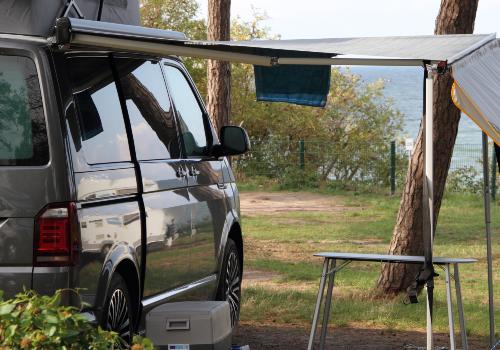
As for safety, our group agrees that we have felt much less safe staying at traditional vacation options such as motels, hotels, rental homes, or all-inclusive resorts than at an RV park or campground. None of us have had or witnessed a serious incident at an RV park in all our combined years of camping.
The most common issue, although rare, is the theft of camping gear left outside overnight. Expert campers lock up their coolers, bikes, grills, generators, or other items when they go to bed “just in case” because general safety rules apply no matter where you vacation.
The only time RVers may find themselves feeling unsafe is when boondocking between destinations. Very remote dispersed camping locations can feel just as eerie and unsettling as overnighting along the edge of a Walmart parking lot in an urban area.
The unspoken fact is that RVers tend to have two things on board when they travel that deter crime, so local thieves or other shady campground guests leave you alone.
The first is a dog. Well over half of the RVers bring their dogs on trips because RV parks are very pet-friendly. While you want Fido around because they are part of the family, they do double duty as a guard to alert you of any campsite intruders or even defend you if necessary.
The second is a gun. Traveling to unknown destinations does put you at risk, and at least half of RVers, according to the latest statistics, carry, whether they do so legally or not.
We think the actual number is closer to 75 percent of RV owners who bring one or more guns when they travel. A gun isn’t always just for protection from humans; RVers who hike remote trails also tote to defend themselves against animal attacks.
The reality of RV life is that most people you encounter in campgrounds are supremely friendly, laid-back, and certainly not causing trouble. In addition, we all look out for our camping neighbors, which makes everyone feel safer.
Myth #4: Any Truck Can Tow Any Travel Trailer or Fifth Wheel
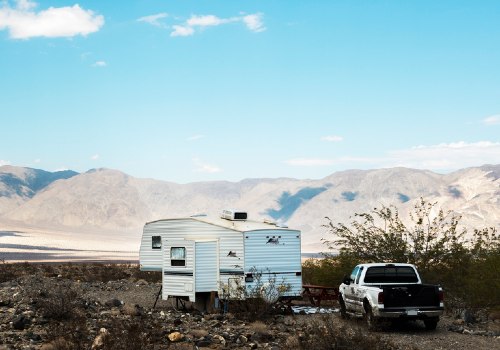
The idea that you can tow any RV as long as you own a pickup truck is not only a myth but highly dangerous!
Highway accidents involving towable RVs are almost always due to exceeding the tow rating of a vehicle or improper hitch connections. Every vehicle with a towing capacity will have a maximum tow rating and GVWR. The ratings, set by truck and SUV manufacturers, ensure the vehicle’s framing and components can withstand the weight and stresses of pulling a trailer down the road.
Want to Connect With a Community of Over 1,078 RV Enthusiasts?
Many RV owners think that as long as they get from point A to point B using a truck not rated for such a heavy trailer, it’s safe to keep doing it. Unfortunately, after several times moving at highway speeds, especially over hilly terrain or on windy days, hitches, brakes, axles, tires, and other components can quickly fail and lead to a devastating accident.
Fifth-wheel hitches connect in the bed of a truck, which also changes how you drive while towing an RV. Therefore, fifth-wheel camper owners need to have a truck with the appropriate payload capacity to support the hitch and weight of the RV during trips.
It’s also important to remember that two trucks that look identical on the exterior can have vastly different tow ratings. Most truck dealers have tow package options for buyers, so if you’re hauling a camping trailer, you must install a package that meets or exceeds the requirements necessary to tow it safely.
The bottom line is that it’s irresponsible and unsafe to tow a camper with a truck until you know it can handle the weight of the RV. And don’t forget the additional weight once you have it fully loaded with gear and other supplies, which can quickly increase the overall weight by 500 to 1,000 pounds.
Myth #5: You Need a Large RV To Be Comfortable
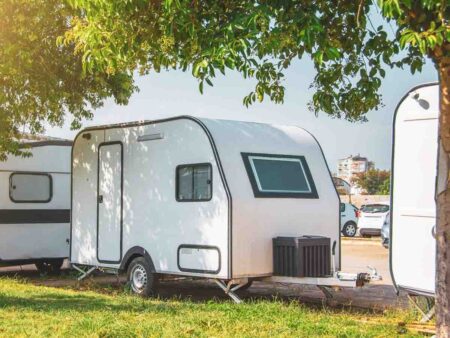
This myth is false. Sometimes, a small campervan with an excellent floor plan can be just as comfortable as a luxurious 45-foot Class A motorcoach.
It is true that once you park at a campground, it’s nicer to have the extra space found in a large fifth-wheel or motorhome so that guests can spread out. However, if you take the time to purchase an RV with a floor plan that suits your needs, any camper length can be efficient and comfortable for guests.
The only instance we feel a massive RV is a good idea is if you plan to camp seasonally, where you only have to drive and park the RV once every few months. Or, if you know, the RV campground you intend to stay in has large pull-through sites that make parking easy.
For many reasons, newcomers to the RV world don’t understand that bigger is almost never better when buying a camper for weekend or week-long trips.
Let’s start by pointing out the obvious – a bigger RV will use more fuel to drive or tow to your destination. When gas and diesel prices rise, this extra cost can put a real damper on other camping activities you want to plan.
The next downside to a big RV is that many older private RV parks and most states and national park campgrounds have size limitations on their campsites that top out at around 35 feet. Even newer RV parks may only have five or ten “deluxe” or extra-long campsites available for big rigs (at a higher fee, we must add), so finding availability can become a challenge.
Another factor is that even if you quickly find campgrounds to fit your 35-foot and larger RV, maneuvering it through the park and backing it into your campsite will be much more difficult than a 25-foot travel trailer or motorhome.
A full-size heavy-duty truck towing a 40-foot fifth wheel needs way more room and time than you can imagine getting parked, often jamming up campground roads for other guests until you finish. And let’s not forget you’re at a campground, so there will be plenty of trees, other RVs, structures, and landscaping features you must avoid.
Lastly, maintaining an RV requires time and money. The bigger the RV, the more time and money you’ll spend washing, waxing, recaulking, resealing the roof, replacing gaskets and sewer lines, fixing appliances, etc. It’s still a home, just on wheels. Storage fees for a large recreational vehicle will also cost more.
Do you know what all of this adds up to? Extra stress! So, please think twice about how and where you plan to camp before you shell out for the biggest RV you can find, or you may regret it.
RV Camping Myths Wrap-Up
These are just some of the RV camping myths out there, and we hope the reality gives you a better idea of what to expect if you take up the RV lifestyle.
We encourage anyone shopping for an RV to think about what kind of camping experience you’re looking for before signing on the dotted line. The more you know before you buy, the happier you will be with your RV and the camping destinations you select!
5 Wild Camping Myths (Video)
"Man cannot discover new oceans unless he has the courage to lose sight of the shore."
-- Andre Gide

